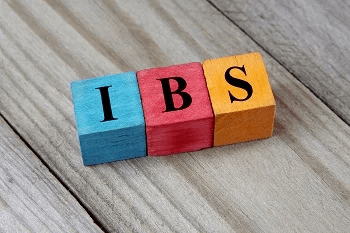By Dr Adam Simon
IBS Medication: Your Ticket to Drama-free Digestion?
While IBS can't be cured, it can certainly be managed. Take a look at our guide to the different medications available.
While Irritable Bowel Syndrome (IBS) can't be cured, it can certainly be managed. For some, identifying trigger foods and eliminating them from your diet is enough to successfully keep IBS in check.
However, if this doesn't work, a doctor might suggest medication as a way of managing your symptoms. In this guide, we'll help you understand what your options are, how they'll help and, crucially, any possible side effects you might experience.
Laxatives
If constipation is one of your main symptoms, laxatives can make going to the toilet easier. That said, you can't just throw any old laxative at this problem. There are many different types, each of which has a different impact on your gut, so it's best to consult with a doctor before taking anything.
For example, bulk-forming laxatives help absorb more water into your gut, osmotic laxatives allow your poo to retain more water and stimulant laxatives affect the nerves in your gut to speed up the process. Occasionally, bulk-forming and osmotic laxatives might be used at the same time.
When it comes to using laxatives, you should always follow the medical advice you're given. Some work more quickly than others, but don't assume that a fast-acting laxative is the best option, or that exceeding the recommended dosage will clear your constipation quicker. If anything, overuse is more likely to send you too far the other way and lead to diarrhoea.
There's likely a very good medical reason that you've been prescribed a particular laxative over the alternatives available, so resist any temptation to go your own way with this one.
Possible Laxative Side Effects
Even if you use laxatives as exactly as instructed, you might still experience the following side effects. Your doctor should inform you of these, but if your symptoms persist or become more serious, talk to a doctor:
- Stomach cramps
- Bloating and wind
- Nausea
- Dehydration
- Dizziness
- Headaches
Anti-diarrhoea Medicines
Let's face it, diarrhoea is something we'd all rather avoid. If your IBS is causing toilet troubles that a high-fibre diet isn't fixing, your doctor might prescribe medication to combat it.
As with laxatives, each medicine deals with your diarrhoea in a different way, so consult a doctor before choosing one. The most common treatment, loperamide, slows down the digestion process, giving your gut more time to absorb water from your poo, whereas other medicines work by reducing the amount of water in your small intestine.
This sort of medication should be regarded as a short-term solution. If you find yourself taking the same anti-diarrhoea medicine for longer than a week, it's time to go back to the doctor.
Possible Side Effects of Anti-diarrhoea Medication
Your medication could cause the following side effects. As anti-diarrhoea medication shouldn't be taken for very long, these shouldn't be anything to worry about, but you should consult a doctor if they persist after you stop taking your medication.
- Drowsiness
- Dizziness
- Stomach cramps
- Bloating and wind
- Some people develop a rash
Antispasmodics
Every bowel movement you experience is due to muscles contracting along your digestive tract. If you have IBS, these contractions can occur more frequently than normal, causing symptoms such as bloating and stomach cramps.
For some people, an antispasmodic can make these contractions less frequent, restoring some sort of order to your digestive system and helping with the aforementioned symptoms.
Possible Side Effects of Antispasmodics
An antispasmodic can affect muscles in other areas of your digestive system, such as your mouth, which can make it difficult to produce saliva. Using an antispasmodic containing peppermint oil can also lead to indigestion in some people.
- Dry mouth
- Heartburn
- Constipation
- Bloating and gas
Antidepressants
Let's clear something up nice and early. While this sort of medication is indeed normally used to treat depression, that's not what it's doing here. It's prescribed in much lower doses than usual and serves to limit pain or cramp signals going from your gut to your brain.
You will usually not notice any effect here for at least a couple of weeks, while as you can see from the side effects below, it's also possible that this method will cause as many problems as it solves.
Possible side effects of antidepressants in IBS patients
Given that you're only using a very low dosage of antidepressants, side effects should also be quite mild. However, you might still experience some of these symptoms and you should talk to a doctor if you're concerned.
- Dry mouth
- Drowsiness
- Blurred vision
- Diarrhoea
- Constipation
Psychological Treatment
The concept of the 'gut-brain axis' has long been used to explain the link between stress and IBS.
Essentially, the theory is that if you're anxious about your symptoms, they will likely get worse. Understandably, some people find it difficult to ignore their worries. Coping with this stress could be key to managing your IBS and there are a number of psychological treatments available that might help.
Cognitive Behavioural Therapy (CBT) will help teach you techniques that will deal your anxiety about IBS. You will discover the source of your worries and develop coping mechanisms that will prevent you focusing on the possible bad outcomes of your condition.
If this doesn't work, some people find Hypnotherapy achieves the same results. It's important not to confuse this with 'hypnosis', which is something more associated with magicians. This is a proper medical technique in which the patient stays conscious throughout. Its association with IBS has been studied many times, including this paper from the American Journal of Gastroenterology, which summarises that hypnotherapy can be an effective treatment in a controlled setting.
When it comes to achieving the relaxed psychological state needed to control the gut-brain axis, pursuits such as yoga and pilates can help you leave your troubles behind.
You Could Also Try...
In addition to these methods, there are some tricks that some people swear by. You're unlikely to find a doctor prescribing you these as a primary treatment and peer-reviewed medical evidence for them is somewhat limited, but by all means give them a go and see if they provide any relief.
Some IBS sufferers have reported that acupuncture has helped with their symptoms, while others have cited probiotic products such as yoghurts as the reason for their symptoms improving.
Get even more advice about IBS
If you suffer from IBS and have been helped by medication, why not share your story with others on our Facebook page?
And if you're experiencing IBS symptoms that you'd like to ask a doctor about, book an appointment today.

